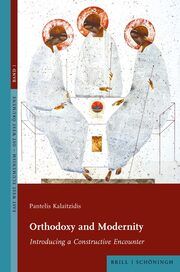Orthodoxy and Modernity
200 Seiten
Lieferzeit: Vorbestellbar
Erscheint am: 29.03.2022
Did Orthodoxy come to a halt before modernity?Does Orthodox Christian theology function only in traditional contexts borrowing schemes and forms of rural society, to which the liturgical and theological symbolisms, the rhetoric models of preaching, the structures of church administration and its views on the relation between religion, politics, and secular society are closely linked?Has Orthodoxy accepted the consequences of modernity or the Orthodox still feel a nostalgia for pre-modern forms of organization and structures of a glorified past, following in this way fundamentalism? Did even the movement called Return to the Fathers, as it was understood, and in spite of its initially renewal character, functioned unwittingly as a barrier, against modernity and its challenges?Modernity and post-modernity constitute, however, the broader historical, social and cultural context within which the Church is called to accomplish its mission and to ceaselessly incarnate the Christian truth.
Pantelis Kalaitzidis is Director of Volos Academy and Research Fellow in American and European Universities. He is also Co-Chairman of St Athanasius Lutheran-Orthodox Theological Fellowship, member of Steering Committee of the Pro Oriente for Catholic-Orthodox Dialogue, Co-Chair of the Political Theology group of IOTA, as well as a member of the EC of EuARe.
| Autor | Kalaitzidis, Pantelis |
|---|---|
| Verlag | Brill Schöningh, Ferdinand |
| ISBN | 9783506795342 |
| ISBN/EAN | 9783506795342 |
| Lieferzeit | Vorbestellbar |
| Erscheinungsdatum | 29.03.2022 |
| Lieferbarkeitsdatum | 30.04.2025 |
| Einband | Gebunden |
| Seitenzahl | 200 S. |
Weitere Informationen
| Verlag | Brill Schöningh, Ferdinand |
|---|---|
| ISBN | 9783506795342 |
| Erscheinungsdatum | 29.03.2022 |
| Einband | Gebunden |
Did Orthodoxy come to a halt before modernity?Does Orthodox Christian theology function only in traditional contexts borrowing schemes and forms of rural society, to which the liturgical and theological symbolisms, the rhetoric models of preaching, the structures of church administration and its views on the relation between religion, politics, and secular society are closely linked?Has Orthodoxy accepted the consequences of modernity or the Orthodox still feel a nostalgia for pre-modern forms of organization and structures of a glorified past, following in this way fundamentalism? Did even the movement called Return to the Fathers, as it was understood, and in spite of its initially renewal character, functioned unwittingly as a barrier, against modernity and its challenges?Modernity and post-modernity constitute, however, the broader historical, social and cultural context within which the Church is called to accomplish its mission and to ceaselessly incarnate the Christian truth.
Pantelis Kalaitzidis is Director of Volos Academy and Research Fellow in American and European Universities. He is also Co-Chairman of St Athanasius Lutheran-Orthodox Theological Fellowship, member of Steering Committee of the Pro Oriente for Catholic-Orthodox Dialogue, Co-Chair of the Political Theology group of IOTA, as well as a member of the EC of EuARe.
Kategorie

